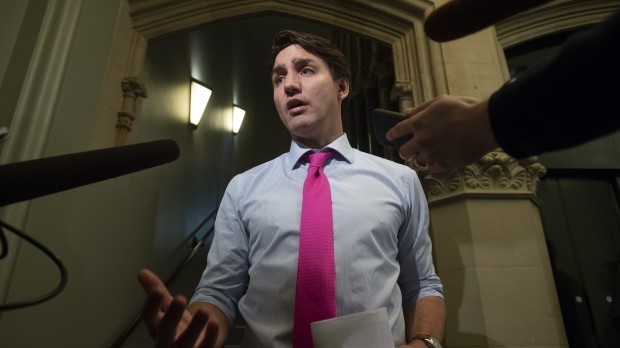Liberal bleeding after SNC-Lavalin affair seems to have stopped: Poll

OTTAWA — A new poll suggests the federal Liberals have stopped the bleeding from the beating they took in the SNC-Lavalin furor.
The Leger poll suggests the Liberals have closed the gap slightly with the front-running Conservatives since April and dissatisfaction with Prime Minister Justin Trudeau and his government has eased a bit.
More significantly, the poll also suggests the Liberals have opened up a 14-point lead over the Conservatives when it comes to which of the two main parties Canadians would prefer to see form government after the Oct. 21 vote.
At the same time, however, the poll suggests more Canadians are worried about the prospect of four more years of Trudeau’s Liberals than they are about the Conservatives regaining power.
The poll of 1,528 Canadians, randomly recruited from Leger’s online panel, was conducted between June 7 and 10 for The Canadian Press; polling experts say online surveys cannot be assigned a margin of error because they do not generate a random sample of the population.
Thirty-eight per cent of respondents said they’d vote for Scheer’s Conservatives if an election were held today, versus 29 per cent for Trudeau’s Liberals — a two-point dip for the Tories and a two-point uptick for the Grits.
Another 13 per cent said they’d vote for Jagmeet Singh’s NDP, 11 per cent for Elizabeth May’s Green party and three per cent for Maxime Bernier’s fledgling People’s Party of Canada.
Fifty-eight per cent registered dissatisfaction with Trudeau’s government, down seven points, while 36 per cent said they were satisfied, up five points.
And 25 per cent picked Scheer as the leader they think would make the best prime minister, unchanged since April, while 22 per cent picked Trudeau, up two points. Another eight per cent picked May, six per cent chose Singh and four per cent Bernier.
A Leger poll in April found support for the Liberals and Trudeau had sunk to a new low, in the immediate aftermath of the SNC-Lavalin affair. Trudeau lost two senior cabinet ministers, a top aide and the country’s top public servant as a result of allegations that his former attorney general, Jody Wilson-Raybould, was improperly pressured by the Prime Minister’s Office last fall to halt a criminal prosecution of the Montreal engineering giant.
While the latest survey suggests only very modest improvement for the ruling party on most questions, the biggest change came when respondents were asked whether Canada would be better off under a Liberal or a Conservative government: 34 per cent preferred the Liberals versus 20 per cent the Conservatives. In April, the Liberals had only a five-point lead over the Conservatives (30 to 25) on that question.
Leger executive vice-president Christian Bourque speculated that the shift is due to people getting past their initial reaction to the SNC-Lavalin affair and focusing on the choice they’ll have to make at the ballot box in October.
“My guess is that all the news coverage, all the polls and all the pundits saying that the Conservatives were surging, that the Liberals were in trouble, maybe some people are waking up and saying, ‘Wait a minute here, I stated my case on whatever my thoughts were on the Wilson-Raybould crisis and therefore (said) not Trudeau but, hey, what’s the outcome?’ ”
But the poll also suggests there are some contrary impulses at play as voters contemplate the coming election. Forty-six per cent of respondents said they’re most worried about the prospect of four more years of Trudeau’s government while 37 per cent said they’re most concerned about the prospect of the Conservatives regaining power.
Bourque said the results suggest to him that the coming campaign could see the Conservatives trying to turn the election into a referendum on Trudeau’s leadership and the Liberals trying to turn it into a referendum on what their party stands for.
On at least two of the issues that are likely to feature prominently in the campaign, the poll suggests the Liberals are more in line with the majority of Canadians than the Conservatives and more likely to pick up support from NDP and Green sympathizers.
Asked to choose between two options, 53 per cent said the federal government should put priority on protecting the environment even if it means making tough economic decisions, whereas 47 per cent said the priority should be finding new foreign markets for the oil industry to ensure growth in that key sector of the economy.
And 63 per cent said a priority should be put on investing in communities even if it means postponing a return to balanced budgets for another four years, compared to 37 per cent who said the priority should be on returning to budgetary surplus even if it means cutting spending.
However, on immigration, the poll suggest the Conservatives are more aligned with majority opinion than the Liberals. Sixty-three per cent of respondents said the priority should be on limiting the number of immigrants to Canada each year since the country might be reaching a limit to its ability to integrate them. Just 37 per cent said priority should be on increasing the number of immigrants to ensure meeting the demands of a growing economy.






